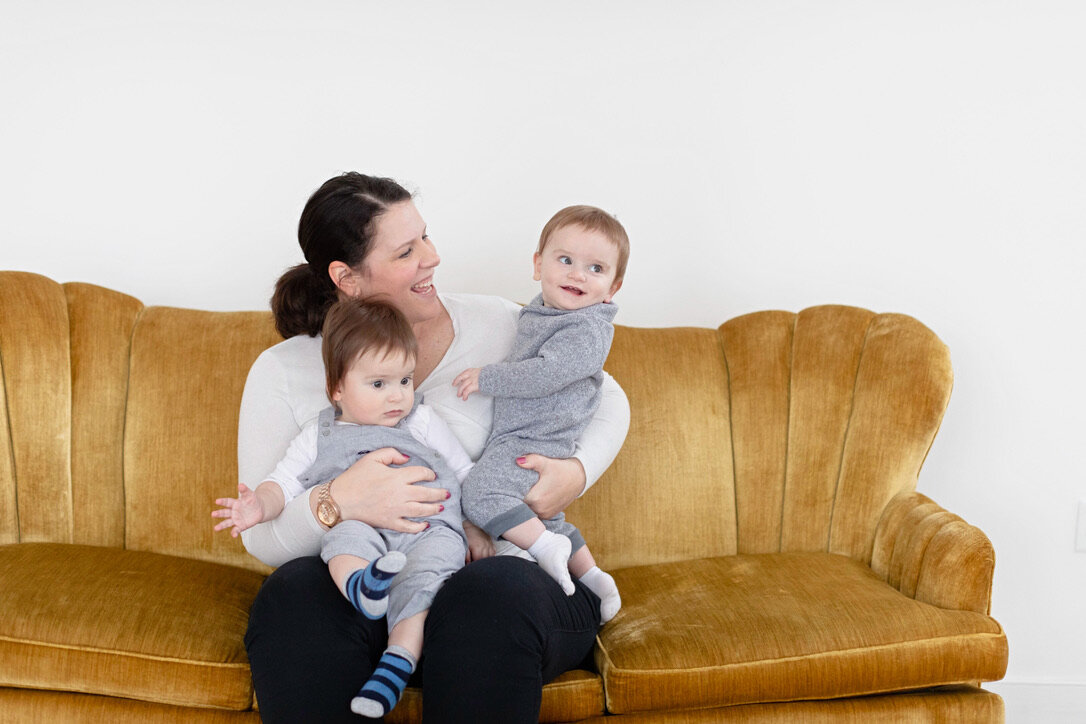Eight Common Baby Sleep Myths - BUSTED
The first few months of parenthood can seem like a blur, especially for first-time parents that do not know what to expect. You are sleep-deprived, hungry, and just outright TIRED. You start doubting yourself and wondering if this is how raising a baby is supposed to feel like. When you bring up the fact that you are tired and your baby is not sleeping well, you start getting all the unsolicited advice from people that may or may not be TRUE. You even find yourself asking questions on online mom groups about your baby’s sleep and find yourself even more confused. Well, there is a ton of WRONG information out there when it comes to baby sleep.
I want to bust some of the most common myths when it comes to baby sleep. List in the comments which one/ones you have been told.
1. “You are damaging your baby if you sleep train them.”
TRUTH: Studies have shown that sleep training does not affect your baby’s brain nor does it damage them in any way. The AAP cites several studies that have shown no short-term or long-term impact on the baby’s psychological development from implementing a sleep training protocol.
However, there are several studies that have found short-term improvements in the quality of sleep for children and maternal mood. By using a method that is in line with your family values is also important. So if you do not want to implement a full cry it out method, then don’t. If you want to implement a gradual cry it out because it works for you and your baby then do that instead. Either path you choose, crying will not cause any damage to your baby.
2. “If you hold your baby too much or have them sleep on you then you are forming bad habits.”
TRUTH: Holding your baby when they are a newborn is essential to build that bond and connection. It is completely okay if they fall asleep in your arms as long as you are awake. Sometimes, when babies are overtired and need to catch up on sleep then providing an assisted nap can be beneficial in order to get them out of the overtired cycle.
Now there will come times when your baby or even your toddler wants to be held during their naps. This can be normal especially if they are sick, going through separation anxiety, or a developmental progression. You can hold them to sleep during these times if needed. They will eventually go back to self-soothing and falling asleep on their own once these periods are over. Just don’t bring them on your bed because that is a whole new association that may be harder to fix.
3. “You only need to sleep train your child once.”
TRUTH: The methods used to train your baby are vastly different than what you need to do to get your toddler to sleep. For babies, it’s all about teaching them self-soothing techniques in order to get them to sleep on their own but also keeping the awake windows and other foundations in mind. New methods are also introduced as they go through developmental progressions.
For toddlers, it’s a little different. The focus changes from teaching them how to self-soothe to keeping them in their bed without having them walking out of their room every 10 minutes. Toddlers are also very expressive and may delay bedtimes by asking for snacks, request to use the potty, or reading more books. Each age group has its own challenges and struggles when it comes to sleep and therefore, the methods vary depending on the age of the child.
4. “You can use the same sleep training methods for all my children.”
TRUTH: All of your babies are different even though they may be biologically the same. If your first baby responded well to a certain sleep training approach does not mean that the same method will work on your other child/children.
Ever notice how one child sleeps better in car seats or strollers while the other one never sleeps anywhere besides their crib? Well, that is because they are different types of sleepers and therefore will need different approaches in order to help get them to sleep and form proper sleep habits.
5. “Just add cereal to their milk or start solids early so they sleep longer.”
TRUTH: Milk should be their main nutritional source for their first year. You want to make sure that they are getting enough nutrition throughout the day by having adequate amounts of milk. If your baby is of age to start cereal then you can give them cereal but provide it to them separately instead of in their milk.
Now if you added cereal to the milk and it allowed your baby to sleep longer then that’s great but this is not helping them establish long-term healthy sleep habits. This is a short-term solution. We need to focus more on long-term solutions in order to help with their sleep. If your baby is still waking in the middle of the night even after providing adequate nutrition throughout the day then it may not be because they are hungry every time.
6. “Keeping your baby up later will let them wake up later.”
TRUTH: This is one of the most common misconceptions parents have. First of all, we need to understand that early for you as an adult may not be considered early for the baby. In fact, keeping them up later can cause the opposite effect and make them overtired causing them to wake earlier or cause night wakings. Instead, you want to make sure you are following all of the developmentally appropriate awake windows, meeting nutritional needs throughout the day, and your baby is sleeping in an optimal sleep environment.
It can be completely normal for a baby to wake around 6:00-6:30. Some will be nice to you and wake around 7:30/8:00. The last thing you want to do if your baby wakes up early is to put them to bed later. This is not the solution. If they tend to wake up prior to 6:00, then depending on their age they could be hungry and need that early morning feeding. By around 6-7 months babies are ready to drop that morning feeding but some may still need it till they are 12 months old.
7. “Keep your newborn awake during the day so they adjust to day and night.”
TRUTH: Keeping your newborn awake during the day will not help their bodies adjust to day and night. This is a big myth that most parents are told. Instead, what you can do to help their circadian rhythm is to expose them to the morning sun and evening sun.
Be sure to keep newborn awake windows around 45-90 minutes in the first 3 months. Around 4 months is when they start becoming more awake and transition to adult sleep cycles causing longer awake windows. This is when some may see their babies regress in their sleep patterns.
8. “You can’t sleep train your baby if you are breastfeeding.”
TRUTH: All babies, regardless of the way they drink milk, can learn how to sleep. Now nursing to sleep is something different and you want to break that habit (if it’s formed) starting around 4 months or sooner if possible.
You can breastfeed your baby and then have your partner or support person do the rest of the bedtime routine to help break the association of nursing to sleep. You can also continue nursing throughout the night if you want to personally do that as long as your child is not using you for comfort nursing or snacking throughout the night. We want to make sure they get full feeds when they do nurse. Consult your pediatrician and/or lactation educator for more information.
xoxo,
Unnati
For more information on how I help FAMILIES GET RESTED follow along at @nestedtorestedsleep and SIGN UP for my monthly NEWSLETTER.


